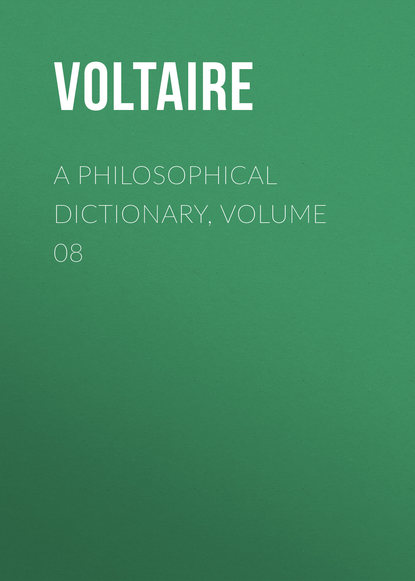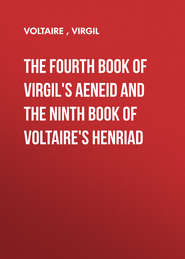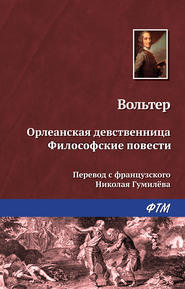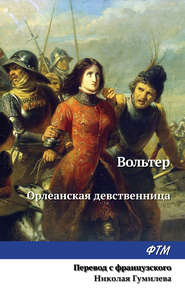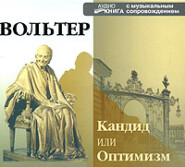По всем вопросам обращайтесь на: info@litportal.ru
(©) 2003-2024.
✖
A Philosophical Dictionary, Volume 08
Настройки чтения
Размер шрифта
Высота строк
Поля
"So long as our Tartars of great and little Thibet are unable to read and write, they will remain ignorant and devout; you may therefore boldly take their money, intrigue with their wives and their daughters, and threaten them with the anger of the god Fo if they complain.
"When the time of correct reasoning shall arrive – for it will arrive some day or other – you will then take a totally opposite course, and say directly the contrary of what your predecessors have said, for you ought to change the nature of your curb in proportion as the horses become more difficult to govern. Your exterior must be more grave, your intrigues more mysterious, your secrets better guarded, your sophistry more dazzling, and your policy more refined. You will then be the pilots of a vessel which is leaky on all sides. Have under you subalterns continually employed at the pumps, and as caulkers to stop all the holes. You will navigate with difficulty, but you will still proceed, and be enabled to cast into the fire or the water, as may be most convenient, all those who would examine whether you have properly refitted the vessel.
"If among the unbelievers is a prince of Calkas, a chief of the Kalmucks, a prince of Kasan, or any other powerful prince, who has unhappily too much wit, take great care not to quarrel with him. Respect him, and continually observe that you hope he will return to the holy path. As to simple citizens, spare them not, and the better men they are, the more you ought to labor to exterminate them; for being men of honor they are the most dangerous of all to you. You will exhibit the simplicity of the dove, the prudence of the serpent, and the paw of the lion, according to circumstances."
The dalai-lama had scarcely pronounced these words when the earth trembled; lightnings sparkled in the firmament from one pole to the other; thunders rolled, and a celestial voice was heard to exclaim, "Adore God and not the grand lama."
All the inferior lamas insisted that the voice said, "Adore God and the grand lama;" and they were believed for a long time in the kingdom of Thibet; but they are now believed no longer.
PRIOR, BUTLER, AND SWIFT
It was not known to France that Prior, who was deputed by Queen Anne to adjust the treaty of Utrecht with Louis XIV., was a poet. France has since repaid England in the same coin, for Cardinal Dubois sent our Destouches to London, where he passed as little for a poet as Prior in France. Prior was originally an attendant at a tavern kept by his uncle, when the earl of Dorset, a good poet himself and a lover of the bottle, one day surprised him reading Horace; in the same manner as Lord Ailsa found his gardener reading Newton. Ailsa made his gardener a good geometrician, and Dorset made a very agreeable poet of his vintner.
It was Prior who wrote the history of the soul under the title of "Alma," and it is the most natural which has hitherto been composed on an existence so much felt, and so little known. The soul, according to "Alma," resides at first, in the extremities; in the feet and hands of children, and from thence gradually ascends to the centre of the body at the age of puberty. Its next step is to the heart, in which it engenders sentiments of love and heroism; thence it mounts to the head at a mature age, where it reasons as well as it is able; and in old age it is not known what becomes of it; it is the sap of an aged tree which evaporates, and is not renewed again. This work is probably too long, for all pleasantry should be short; and it might even be as well were the serious short also.
Prior made a small poem on the battle of Hochstädt. It is not equal to his "Alma"; there is, however, one good apostrophe to Boileau, who is called a satirical flatterer for taking so much pains to sing that Louis did not pass the Rhine. Our plenipotentiary finished by paraphrasing, in fifteen hundred verses, the words attributed to Solomon, that "all is vanity". Fifteen thousand verses might be written on this subject; but woe to him who says all which can be said upon it!
At length Queen Anne dying, the ministry changed, and the peace adjusted by Prior being altogether unpopular, he had nothing to depend upon except an edition of his works; which were subscribed for by his party: after which he died like a philosopher, which is the usual mode of dying of all respectable Englishmen.
Hudibras.
There is an English poem which it is very difficult to make foreigners understand, entitled "Hudibras." It is a very humorous work, although the subject is the civil war of the time of Cromwell. A struggle which cost so much blood and so many tears, originated a poem which obliges the most serious reader to smile. An example of this contrast is found in our "Satire of Menippus." Certainly the Romans would not have made a burlesque poem on the wars of Pompey and Cæsar, or the proscription of Antony and Octavius. How then is it that the frightful evils of the League in France, and of the wars between the king and parliament in England, have proved sources of pleasantry? because at bottom there is something ridiculous hid beneath these fatal quarrels. The citizens of Paris, at the head of the faction of Sixteen, mingled impertinence with the miseries of faction. The intrigues of women, of the legates and of the monks, presented a comic aspect, notwithstanding the calamities which they produced. The theological disputes and enthusiasm of the Puritans in England, were also very open to raillery; and this fund of the ridiculous, well managed, might pleasantly enough aid in dispersing the tragical horrors which abound on the surface. If the bull Unigenitus caused the shedding of blood, the little poem "Philotanus" was no less suitable to the subject; and it is only to be complained of for not being so gay, so pleasant, and so various as it might have been; and for not fulfilling in the course of the work the promise held out by its commencement.
The poem of "Hudibras" of which I speak, seems to be a composition of the satire of "Menippus" and of "Don Quixote." It surpasses them in the advantage of verse and also in wit; the former indeed does not come near it; being a very middling production; but notwithstanding his wit, the author of "Hudibras" is much beneath "Don Quixote." Taste, vivacity, the art of narrating and of introducing adventures, with the faculty of never being tedious, go farther than wit; and moreover, "Don Quixote" is read by all nations, and "Hudibras" by the English alone.
Butler, the author of this extraordinary poem, was contemporary with Milton, and enjoyed infinitely more temporary popularity than the latter, because his work was humorous, and that of Milton melancholy. Butler turned the enemies of King Charles II. into ridicule, and all the recompense he received was the frequent quotation of his verses by that monarch. The combats of the knight Hudibras were much better known than the battles between the good and bad angels in "Paradise Lost"; but the court of England treated Butler no better than the celestial court treated Milton; both the one and the other died in want, or very near it.
A man whose imagination was impregnated with a tenth part of the comic spirit, good or bad, which pervades this work, could not but be very pleasant; but he must take care how he translates "Hudibras." It is difficult to make foreign readers laugh at pleasantries which are almost forgotten by the nation which has produced them. Dante is little read in Europe, because we are ignorant of so much of his allusion; and it is the same with "Hudibras." The greater part of the humor of this poem being expended on the theology and theologians of its own time, a commentary is eternally necessary. Pleasantry requiring explanation ceases to be pleasantry; and a commentator on bon mots is seldom capable of conveying them.
Of Dean Swift.
How is it that in France so little is understood of the works of the ingenious Doctor Swift, who is called the Rabelais of England? He has the honor, like the latter, of being a churchman and an universal joker; but Rabelais was not above his age, and Swift is much above Rabelais.
Our curate of Meudon, in his extravagant and unintelligible book, has exhibited extreme gayety and equally great impertinence. He has lavished at once erudition, coarseness and ennui. A good story of two pages is purchased by a volume of absurdities. There are only some persons of an eccentric taste who pique themselves upon understanding and valuing the whole of this work. The rest of the nation laugh at the humor of Rabelais, and despise the work; regarding him only as the first of buffoons. We regret that a man who possessed so much wit, should have made so miserable a use of it. He is a drunken philosopher, who wrote only in the moments of his intoxication.
Dr. Swift is Rabelais sober, and living in good company. He has not indeed the gayety of the former, but he has all the finesse, sense, discrimination, which is wanted by our curate of Meudon. His verse is in a singular taste, and almost inimitable. He exhibits a fine vein of humor, both in prose and in verse; but in order to understand it, it is necessary to visit his country.
In this country, which appears so extraordinary to other parts of Europe, it has excited little surprise that Doctor Swift, dean of a cathedral, should make merry in his "Tale of a Tub" with Catholicism, Lutheranism, and Calvinism; his own defence is that he has not meddled with Christianity. He pretends to respect the parent, while he scourges the children. Certain fastidious persons are of opinion that his lashes are so long they have even reached the father.
This famous "Tale of a Tub" is the ancient story of the three invisible rings which a father bequeathed to his three children. These three rings were the Jewish, the Christian, and the Mahometan religions. It is still more an imitation of the history of Mero and Enégu by Fontenelle. Mero is the anagram of Rome; Enégu of Geneva, and they are two sisters who aspire to the succession of the kingdom of their father. Mero reigns the first, and Fontenelle represents her as a sorceress, who plays tricks with bread and effects conjuration with dead bodies. This is precisely the Lord Peter of Swift, who presents a piece of bread to his two brothers, and says to them, "Here is some excellent Burgundy, my friends; this partridge is of a delicious flavor." Lord Peter in Swift performs the same part with the Mero of Fontenelle.
Thus almost all is imitation. The idea of the "Persian Letters" was taken from that of the "Turkish Spy." Boyardo imitated Pulci; Ariosto, Boyardo; the most original wits borrow from one another. Cervantes makes a madman of his Don Quixote, but is Orlando anything else? It would be difficult to decide by which of the two knight-errantry is more ridiculed, the grotesque portraiture of Cervantes, or the fertile imagination of Ariosto. Metastasia has borrowed the greater part of his operas from our French tragedies; and many English authors have copied us and said nothing about it. It is with books as with the fires in our grates; everybody borrows a light from his neighbor to kindle his own, which in its turn is communicated to others, and each partakes of all.
PRIVILEGE – PRIVILEGED CASES
Custom, which almost always prevails against reason, would have the offences of ecclesiastics and monks against civil orders, which are very frequent, called privileged offences; and those offences common which regard only ecclesiastical discipline, cases that are abandoned to the sacerdotal hierarchy, and with which the civil power does not interfere.
The Church having no jurisdiction but that which sovereigns have granted it, and the judges of the Church being thus only judges privileged by the sovereign, those cases should be called privileged which it is their province to judge, and those common offences which are punishable by the prince's officers. But the canonists, who are very rarely exact in their expressions, particularly when treating of regal jurisprudence, having regarded a priest called the official, as being of right the sole judge of the clergy, they have entitled that privilege, which in common law belongs to lay tribunals, and the ordinances of the monarch have adopted this expression in France.
To conform himself to this custom, the judge of the Church takes cognizance only of common crime; in respect to privileged cases he can act only concurrently with the regal judge, who repairs to the episcopal court, where, however, he is but the assessor of the judge of the Church. Both are assisted by their register; each separately, but in one another's presence, takes notes of the course of the proceedings. The official who presides alone interrogates the accused; and if the royal judge has questions to put to him, he must have permission of the ecclesiastical judge to propose them.
This procedure is composed of formalities, and produces delays which should not be admitted in criminal jurisprudence. Judges of the Church who have not made a study of laws and formalities are seldom able to conduct criminal proceedings without giving place to appeals, which ruin the accused in expense, make him languish in chains, or retard his punishment if he is guilty.
Besides, the French have no precise law to determine which are privileged cases. A criminal often groans in a dungeon for a whole year, without knowing what tribunal will judge him. Priests and monks are in the state and subjects of it. It is very strange that when they trouble society they are not to be judged, like other citizens, by the officers of the sovereign.
Among the Jews, even the high priest had not the privilege which our laws grant to simple parish priests. Solomon deposed the high priest Abiathar, without referring him to the synagogue to take his trial. Jesus Christ, accused before a secular and pagan judge, challenged not his jurisdiction. St. Paul, translated to the tribunal of Felix and Festus, declined not their judgment. The Emperor Constantine first granted this privilege to bishops. Honorius and Theodosius the younger extended it to all the clergy, and Justinian confirmed it.
In digesting the criminal code of 1670, the counsellor of state, Pussort, and the president of Novion, wished to abolish the conjoint proceeding, and to give to royal judges alone the right of judging the clergy accused of privileged cases; but this so reasonable desire was combated by the first president De Lamoignon, and the advocate-general Talon, and a law which was made to reform our abuses confirmed the most ridiculous of them.
A declaration of the king on April 26, 1657, forbids the Parliament of Paris to continue the proceeding commenced against Cardinal Retz, accused of high treason. The same declaration desires that the suits of cardinals, archbishops, and bishops of the kingdom, accused of the crime of high treason, are to be conducted and judged by ecclesiastical judges, as ordered by the canons.
But this declaration, contrary to the customs of the kingdoms, has not been registered in any parliament, and would not be followed. Our books relate several sentences which have doomed cardinals, archbishops, and bishops to imprisonment, deposition, confiscation, and other punishments. These punishments were pronounced against the bishop of Nantes, by sentence of June 25, 1455; against Jean de la Balue, cardinal and bishop of Angers, by sentence dated July 29, 1469; Jean Hebert, bishop of Constance, in 1480; Louis de Rochechouart, bishop of Nantes, in 1481; Geoffroi de Pompadour, bishop of Périgueux, and George d'Amboise, bishop of Montauban, in 1488; Geoffroi Dintiville, bishop of Auxerre, in 1531; Bernard Lordat, bishop of Pumiers, in 1537; Cardinal de Châtillon, bishop of Beauvais, the 19th of March, 1569; Geoffroi de La Martonie, bishop of Amiens, the 9th of July, 1594; Gilbert Génébrard, archbishop of Aix, the 26th of January, 1596; William Rose, bishop of Senlis, September 5, 1598; Cardinal de Sourdis, archbishop of Bordeaux, November 17, 1615.
The parliament sentenced Cardinal de Bouillon to be imprisoned, and seized his property on June 20, 1710.
Cardinal de Mailly, archbishop of Rheims, in 1717, made a law tending to destroy the ecclesiastical peace established by the government. The hangman publicly burned the law by sentence of parliament.
The sieur Languet, bishop of Soissons, having maintained that he could not be judged by the justice of the king even for the crime of high treason, was condemned to pay a fine of ten thousand livres.
In the shameful troubles excited by the refusal of sacraments, the simple presidial of Nantes condemned the bishop of that city to pay a fine of six thousand francs for having refused the communion to those who demanded it.
In 1764, the archbishop of Auch, of the name of Montillet, was fined, and his command, regarded as a defamatory libel, was burned by the executioner at Bordeaux.
These examples have been very frequent. The maxim, that ecclesiastics are entirely amenable to the justice of the king, like other citizens, has prevailed throughout the kingdom. There is no express law which commands it; but the opinion of all lawyers, the unanimous cry of the nation, and the good of the state, are in themselves a law.





